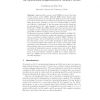Free Online Productivity Tools
i2Speak
i2Symbol
i2OCR
iTex2Img
iWeb2Print
iWeb2Shot
i2Type
iPdf2Split
iPdf2Merge
i2Bopomofo
i2Arabic
i2Style
i2Image
i2PDF
iLatex2Rtf
Sci2ools
255
Voted
FCSC
2016
2016
An operational happens-before memory model
Happens-before memory model (HMM) is used as the basis of Java memory model (JMM). Although HMM itself is simple, some complex axioms have to be introduced in JMM to prevent the causality loop, which causes absurd out-of-thin-air reads that may break the type safety and security guarantee of Java. The resulting JMM is complex and difficult to understand. It also has many anti-intuitive behaviors, as demonstrated by the “ugly examples” by Aspinall and ˇSevˇc´ık [3]. Furthermore, HMM (and JMM) specify only what execution traces are acceptable, but say nothing about how these traces are generated. This gap makes it difficult for static reasoning about programs. In this paper we present OHMM, an operational variation of HMM. The model is specified by giving an operational semantics to a language runan abstract machine designed to simulate HMM. Thanks to its generative nature, the model naturally prevents out-of-thin-air reads. On the other hand, it uses a novel replay mechanism to...
Related Content
| Added | 03 Apr 2016 |
| Updated | 03 Apr 2016 |
| Type | Journal |
| Year | 2016 |
| Where | FCSC |
| Authors | Yang Zhang, Xinyu Feng |
Comments (0)

